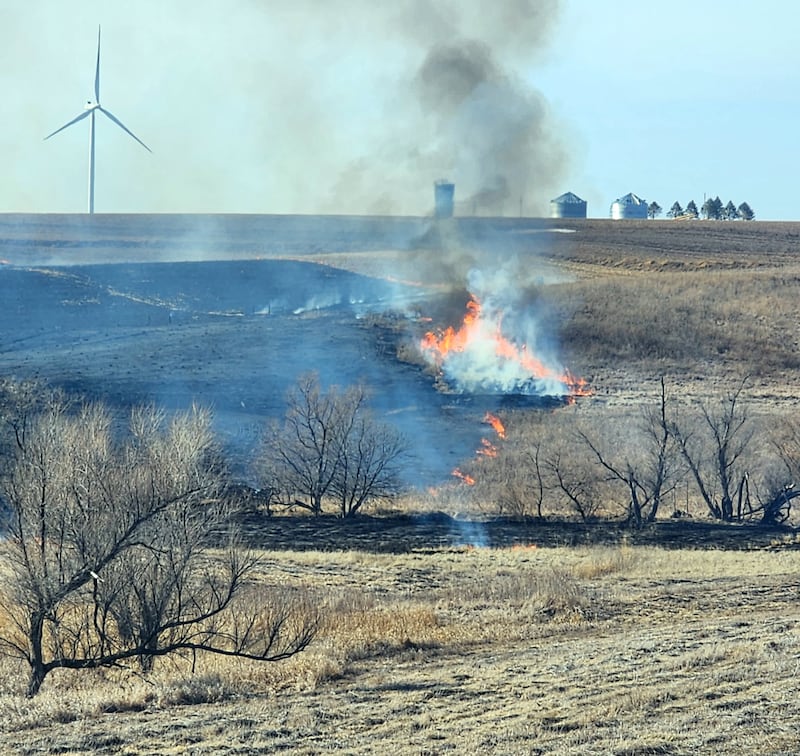The state of Illinois has been experiencing very dry conditions since August, and with temperatures expected to remain unseasonably warm through at least the first week of October, residents are reminded by fire and public safety officials to be cautious about fire safety.
The Illinois Farm Bureau said August was the driest for the Corn Belt since 2013, and the Illinois State Climatologist’s office noted that as of Sept. 11, more than 30% of the state was experiencing “abnormal dryness” to moderate drought conditions, with the situation worsening in the southern half of the state.
Since then, dry conditions have continued throughout the state, with temperatures increasing well above the seasonal averages. An updated map on Sept. 25 showed that the percentage had risen to almost 97% of the state being at least “abnormally dry,” with the only exception along the state’s border with northwest Iowa, according to the state climatologist office.
Although the National Weather Service notes that the average high temperatures in the Chicago area for late September are usually in the high 60s to mid-70s, temperatures reached more than 80 degrees for 15 of the month’s last 20 days. Only four days experienced light rain amounting to less than ½ inch of precipitation.
This trend is expected to continue through early October, with the first chance of rain in the area not expected until Oct. 7, according to Accuweather.
:quality(70)/cloudfront-us-east-1.images.arcpublishing.com/shawmedia/YS273UBUZJAEXN2SMMGO5QEQWU.jpg)
Burn bans and fire risks
Some communities already have introduced burn bans, including Princeton, out of an abundance of caution, but cities further north have so far just advised heightened caution.
Lee County officials made a few changes to a proposed ordinance that would regulate open burning in the county’s unincorporated areas.
The revisions would make the ordinance less restrictive, most notably by allowing open burning at any time of day or night, according to the ordinance. It’s been held over twice by the Lee County Board, at the August and September meetings, but is set to be up for approval at the Oct. 23 meeting.
What hasn’t changed is that, if approved, the ordinance would ban burning all materials, except landscape and agricultural waste, during “periods of elevated fire risk” such as during a red-flag warning.
The Lockport Township Fire Protection District in Will County “is closely monitoring the unseasonably hot and dry weather conditions we’ve been experiencing,” Fire Chief John O’Connor said.
“Extended periods of dryness increase the risk of brush fires, grass fires and other outdoor fire hazards,” he said. “We want to remind our community to exercise caution during this time, avoid opening burning, properly dispose of smoking materials, and be mindful when using equipment outdoors that may create sparks.”
:quality(70)/cloudfront-us-east-1.images.arcpublishing.com/shawmedia/C4VSNG7EDVB5ZKW2PTRM3BL4MY.jpg)
John Lukancic, director of emergency and disaster management for the city of Joliet, said: “The fire risk is above average for almost all of Illinois, which is a problem, especially for crops and farm fields. We’re asking people to be aware of this increased fire risk and realize it can make things easier to spread.”
Lukancic asked people to be especially cautious when cooking or burning fires outside in dry conditions.
“If you’re burning anything, please be cautious and have water nearby or a hose, and make sure you’re following all local ordinances,” he said. “Even embers can start a large fire, so be aware of the increased risk.”
O’Connor also noted the risks to individuals in the unseasonable weather, advising residents to “stay hydrated, check on vulnerable neighbors, and never leave children or pets in parked vehicles in high heat.”
Risks to farm fields
According to the Illinois State Fire Marshal’s Office, burn bans are issued at the municipal or county level, but hot, dry weather across the state increases fire risks.
“Dry vegetation in fields and wildland areas creates high fuel loads that can ignite quickly and spread rapidly, putting farmers, nearby homes and surrounding property at risk,” Illinois State Fire Marshal Michele Pankow said. “By following these important safety tips, we can reduce the risk of accidental fires while protecting our farmers, communities and first responders.”
:quality(70)/cloudfront-us-east-1.images.arcpublishing.com/shawmedia/BIN33ZDJVRGJNKTAWMJNUK4JM4.jpg)
JC Fultz, the fire marshal office’s public information officer, noted some basic safety precautions residents should take as the dry weather continues:
- Properly extinguish all cigarettes and cigars, and properly dispose of them (never throwing them out of cars).
- Make sure chains and trailers are not dragging the ground behind vehicles, which can throw sparks.
- Do not use tools that throw sparks around dry vegetation.
- Check local community outdoor burning guidelines.
The Illinois Department of Agriculture cautioned farmers, who are at an increased risk for brush fires in dry fields.
“During drought conditions, a single spark can quickly ignite a field,” Director Jerry Costello II said in a written statement. “We want to remind farmers to treat every dry field as a potential fire hazard and to take the necessary precautions to prioritize their own safety – as well as their neighbors’ and first responders’ – during this busy season."
Farmers are asked to properly maintain equipment and practice safe harvesting practices in the coming weeks by:
- inspecting equipment daily and removing built-up debris
- lubricating bearings and chains to prevent overheating and sparks
- inspecting all machinery’s wiring and electrical equipment
- harvesting during cooler, less windy periods
- carrying fire extinguishers with farm equipment
- taking regular breaks
- keeping a tractor with a disk in a safe location and preparing to help stop a fire from spreading, as plowing a wide trench in a field has been proven to stop the spread of farm fires.
“There’s always a concern about fires in our line of work, but our biggest message to the public is just to be smart,” Morris Fire Protection District Deputy Chief Jeff Wilson said. “If you’re a farmer, have someone watching your fields and equipment for a fire to start, and be prepared in case of emergency.”
Shaw Local News reporter Payton Felix contributed to this story.
